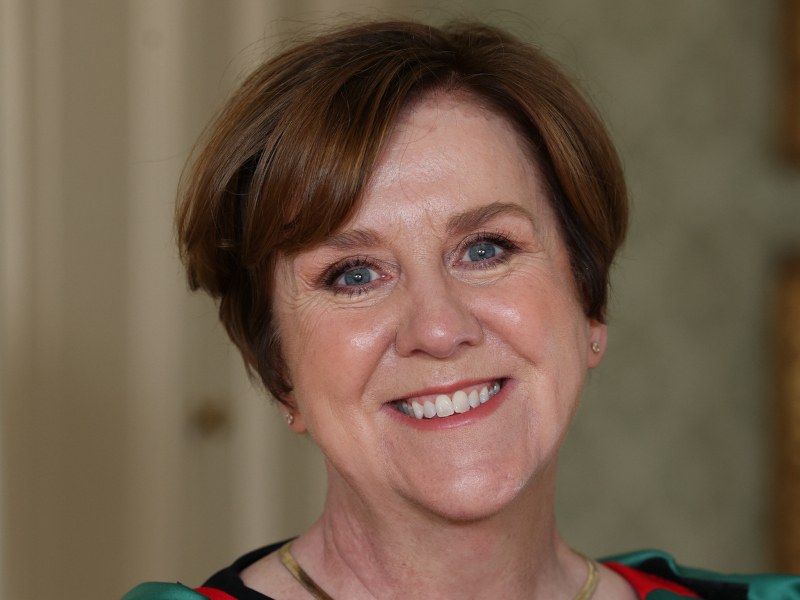
A leading researcher in translational medicine and cancer therapies, Prof Orla Sheils is also vice-provost at Trinity College Dublin.
As chief academic officer and vice-provost, Prof Orla Sheils is one of Trinity College Dublin’s (TCD) most senior leaders. Her role means she is responsible for academic staff and overseeing the college’s research strategies. But, like a lot of senior academics, her first love was research and she is still very much involved with the discipline she began her career in.
“My research career began in the diagnostic histopathology laboratory setting,” she tells SiliconRepublic.com. “As a novice researcher, I was charged with establishing a molecular pathology suite adjacent to the diagnostic service laboratory. In doing this my intention was to establish a translational research bridge, exploring areas that might impact on routine service delivery.”
‘Research can sometimes operate in silos that try to separate basic, translational and implementation research. But most progress comes when they are seen as interconnected elements of a spectrum’
Now known internationally for her work in translational medicine, cancer research and molecular diagnostics, Sheils has come full circle at TCD. It was there she got her PhD in molecular pathology. Years later, she became the founding director of the Trinity Translational Medicine Institute before going on to serve as dean of the university’s Faculty of Health Sciences and then accepting her current role.
Translational, outside-the-box approach
She explains that her research career spanned “several facets” – such as sample preparation and assay design, functional genomics and genomic analysis focused on driver mutations of cancer progression and metastasis. Overall, she describes her research focus as “patient-centred” and “translational” or multidisciplinary. Translational research is, as Sheils says, an approach suited to medicine.
“Medical research includes basic, translational and clinical research along with implementation in clinical practice. It is not a linear model, rather it is a multidimensional one with a high level of complexity and interconnectedness.
“Research can sometimes operate in silos that try to separate basic, translational and implementation research,” she says. “But most progress comes when they are seen as interconnected elements of a spectrum.” Something she has learned throughout her career is to always keep the patient at the centre of her research question. “That keeps the focus where it needs to be,” she says, adding that researchers can often forget about the patient when trying to balance the expectations of the funding agencies who control the purse strings.
‘Patients are the sum of multiple pathologies, life events and exposures’
That’s not to say that one cannot align the expectations of funders and industry players with the needs of patients. Throughout her career, Sheils has worked with multinational consortia to design, validate and implement panels of assays for early molecular diagnostics and to help predict patients that can be directed to specific treatments using next-generation sequencing and multi-omics approaches.
“This research has established novel sequencing technologies as routine diagnostic testing regimens in clinical laboratories worldwide.” She continues her international leadership work to this day. Earlier this year, she was elected as a member of the Scientific Council of the International Agency for Research on Cancer, representing Ireland.
A changing research landscape
Looking back on her time in research, she believes there have been “huge changes” in the way medical researchers and clinicians view cancer. “Rather than focus only on the site that a cancer may be in, we now look at what molecular changes are driving the cancer to grow and expand. So, we look more at the process than focusing exclusively on the site, when deciding the best treatment option for patients.”
She warns that as the medical profession continues its move into the world of precision and personalised healthcare, it needs to be mindful of societal inequalities that may prevent individuals accessing medicines. The industry has a responsibility towards the people it is trying to help, she believes. Research “should cover the full value chain, ranging from new scientific discoveries to the translation of these discoveries into new treatments”.
‘It is a truism that the best healthcare is delivered in a research rich environment’
“Moreover, it must span the patient’s journey through their cancer disease, perhaps through focused themes on prevention, early detection, improved diagnostics and treatments, including precision surgery, immunotherapies and survivorship.”
With the evolution of cancer treatment, “It is important that the diagnosis of cancer is not seen in isolation and now more than ever the impact of co-morbidities should form part of our research programmes”. She points out that “patients are the sum of multiple pathologies, life events and exposures,” so the medical research field needs to continue to adapt its approaches and thinking as it works to create much-needed treatments. Sheils jokes that she doesn’t often pick up a pipette anymore in her role as TCD’s vice-provost; but she frequently relies on the problem-solving and lateral thinking skills that served her well during her research days.
Fundamentally, she believes in the power of great research to save lives. “It is a truism that the best healthcare is delivered in a research rich environment.” The best research must address questions raised by the doctors and nurses tasked with addressing patients’ needs, she says. “It is in this context that research can really be transformative and positively impact on health and wellbeing. Above all, we must continue to forge ahead through education, research and implementation.”
10 things you need to know direct to your inbox every weekday. Sign up for the Daily Brief, Silicon Republic’s digest of essential sci-tech news.

